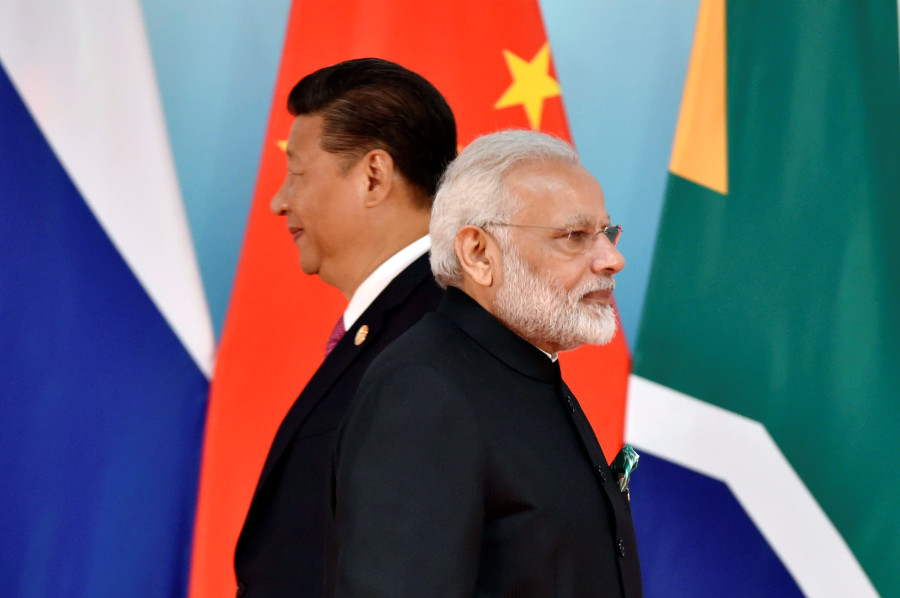Columns
Why are Nepal's two major parties attempting to adhere to imported ideologies?
Either of the schools of thought, one from China and the other from India, is bound to cause severe indigestion in Nepalis.
Pramod Mishra
The KP Oli-led Nepal Communist Party has pulled out another trick to mesmerise Nepalis—the adoption of the Xi Way, following Chinese president Xi Jinping's initiatives. But social media, for all its faults, is not easily fooled. Neither are Nepali intellectuals, who have been watching Mr Oli's gift with words and his regressive deeds over the past few years. But this new embrace of a powerful neighbour's ideas—named after the country's political leader—also reveals something more profound about Nepal's geopolitical constraints and their consequent hold on the Nepali dominant mind.
Before the internet and means of mass communication and transportation became common, the rising mountain peaks and hills limited the horizons of the people living on the slopes and in the valleys. And there was a justifiable excuse for grabbing ideas that reached the valley after having arduously traversed through the mountain passes. So, it was understandable that the Rana and Shah rulers sought glory in their lineage in Rajasthan's Thar desert; the communists swung between their loyalty to Lenin-Stalin and Mao. Similarly, Nepali Congress forever counted the beads of Lohia socialism.
But now that Nepalis live scattered all over the world, and many of their brothers and sisters work the construction sites and factory floors of the Middle East and East and Southeast Asia, Oli has thought of nothing better than to train his party leadership (200 no less), with the help of 40 Chinese Communist Party trainers, in Xi Jinping Thought.
Given the moribund Congress's equally blind grab of Modi Path Hindutva (Hindu nationalism), are Nepalis forever doomed to live on the second-hand, regressive ideas and slogans of others? Are they to swallow these monolithic, my-way-or-the-highway ideas just because they emerged from deep economic pockets and shallow political sympathies?
The questions have become urgent because their answer will have far-reaching consequences for the country and its people. But before we get into the details of the results, it would be essential to figure out why both Congress and the communists are so desperate to grab whatever comes their way from the north or the south.
This desperate idea-grab shows that both the communists and Nepali Congress have gone intellectually bankrupt. The then CPN-UML's effort to adapt itself to multiparty democracy under Madan Bhandari lost its shine by 2006, when the Maoists confronted it with its original idea of economic marginalisation caused by cultural marginalisation. And when confronted by real transformation after the first Constituent Assembly, even the Maoists split and scattered, forgetting the promises on which they had built their insurgency.
After BP Koirala's death, Nepali Congress has been a party for the restoration of democracy and elections; it has not had any original ideas. By the time it helped bring the Maoists into the mainstream, Congress had become solely dependent on political tactics for electoral calculations. The Indian blockade came as a blessing for both the UML and Congress in the elections. And because Oli displayed himself as a nationalist leader against India's bullying at the tail-end of the blockade, his party reaped the most abundant harvest in the first parliamentary elections.
Now that the parliament is half-way through its five-year term, both parties are desperate to grab something, some straw, to anchor themselves in a couple of years.
This turn to Xi Thought for the communists and Modi Path for the Congress could also be an attempt to run away from the real economic and cultural challenges facing these intellectually exhausted parties. While the Xi Way promises the communists a quick-fix to the financial woes of the country, currently sustained by the remittance from Nepali migrant workers, the Hindutva ideology promises the Congress a potentially comfortable electoral victory without addressing the cultural and linguistic demands of the Madhesis and the Janajatis. The Nepal Communist Party thinks that the promise of China's largesse for miraculous infrastructure development will help them win a landslide. Congress believes that the promise of turning Nepal back into a Hindu state will make the Madhesis forget their daily humiliation at the government offices and work as an opioid to their structural marginalisation. Given how the Madhesis and Janjatis are behaving, both the ruling party and the main opposition might very well be politically savvy and clairvoyant.
But at what cost, to the country and the people, will these two detrimental paths be adopted? Anybody who has kept up with the news knows that Xi Jinping's most significant contribution to China is his Belt and Road Initiative policy, coupled with stricter political control over the internet, mass communication and political expression. Anyone watching India over the past few years knows that the democratic space is shrinking there—the menacing and threatening Hindutva is usurping India's justifiably prided pluralism. Hindu pluralism is giving way to Hindutva monoculturalism.
If the love of political freedom has now seeped into Nepalis' genes, cultural pluralism and diversity have been in the very makeup of Nepal's geocultural landscape. Either of the two schools of thought—one from the north and the other from the south—is bound to cause severe indigestion in Nepalis. But the geopolitical rivalry and interference that the embrace of either will cause is the most threatening of all. Even though geographically and culturally closer to India, Nepalis have been fiercely independent. Many among them have been devout Hindus and Buddhists, but their Hinduism and Buddhism have generally been tolerant and embracing of difference in everyday interactions. It's only those associated with the monolingual state who begin to have discriminatory ideas.
But this bending to Xi Thought or Modi Path by the left and the centre-right parties will surely destabilise the country. One hopes that it will also create a political space for a new party to emerge, a party that would use an original approach to address the country's cultural problems without compromising its political freedom, independence and economic aspirations.
***
What do you think?
Dear reader, we’d like to hear from you. We regularly publish letters to the editor on contemporary issues or direct responses to something the Post has recently published. Please send your letters to [email protected] with "Letter to the Editor" in the subject line. Please include your name, location, and a contact address so one of our editors can reach out to you.




 10.12°C Kathmandu
10.12°C Kathmandu















